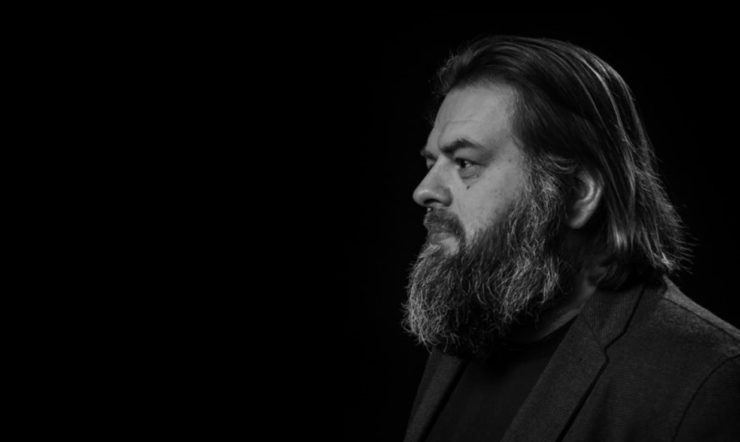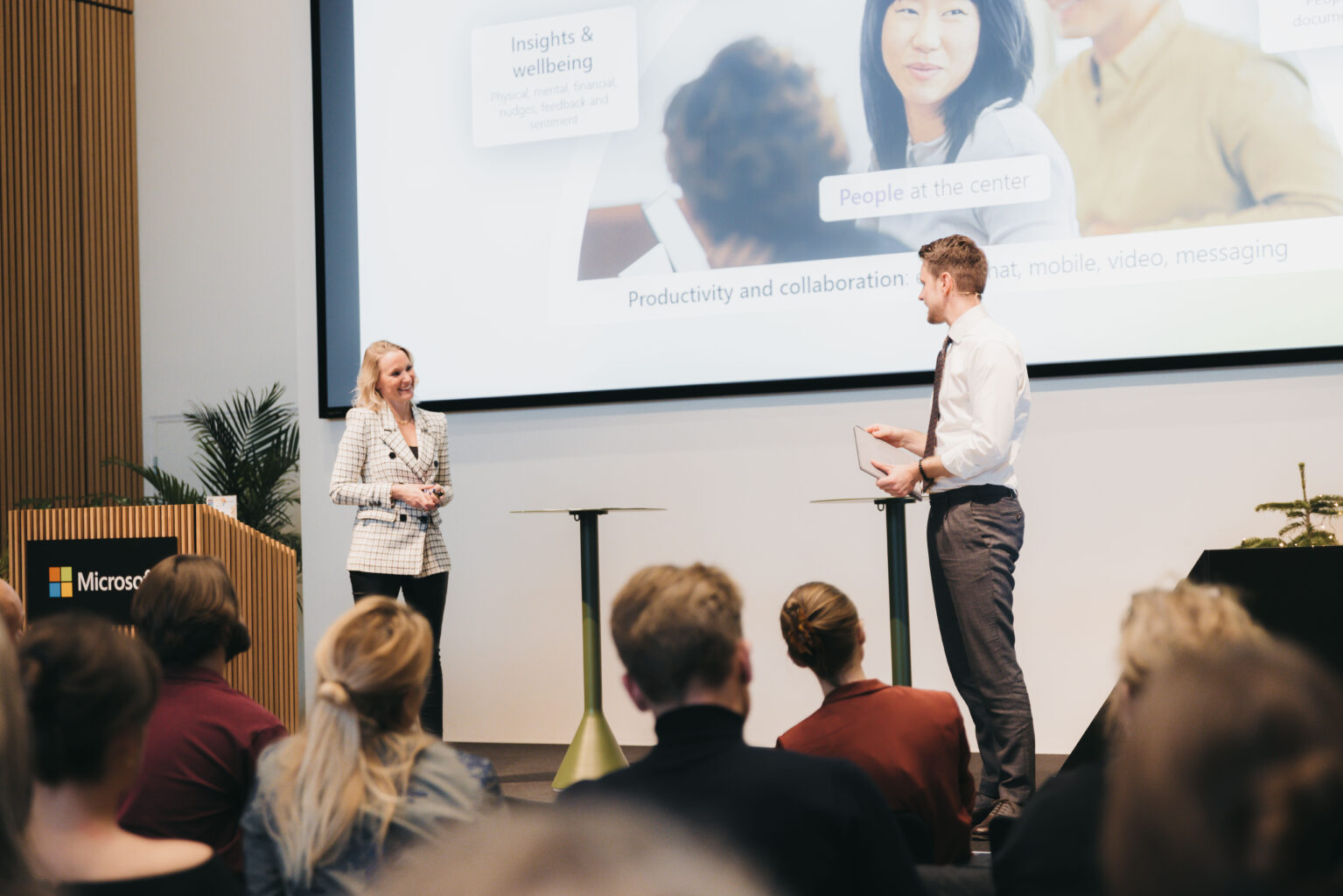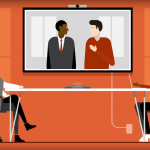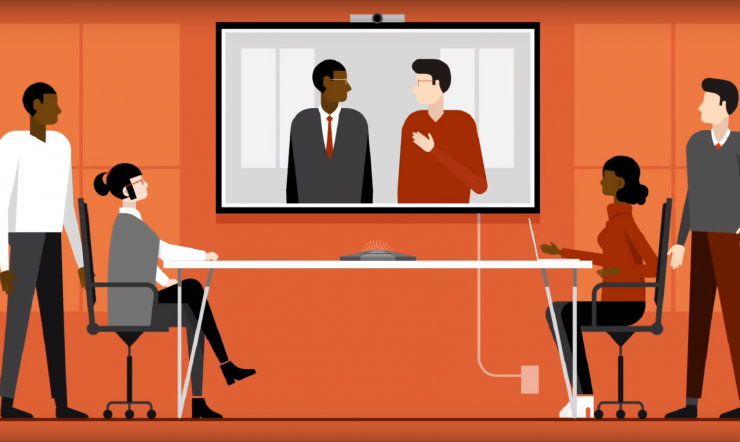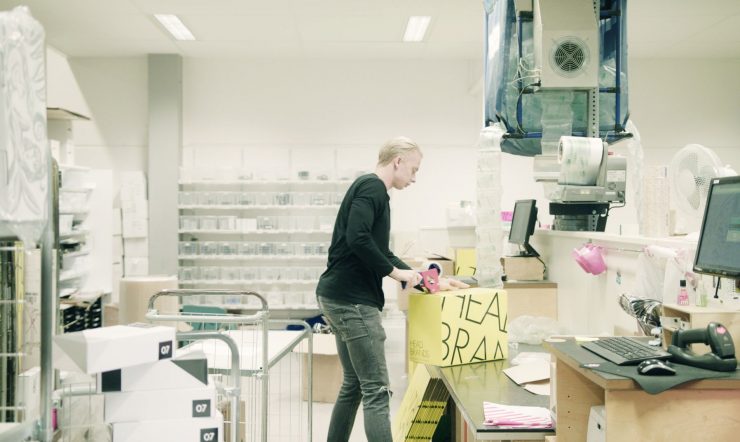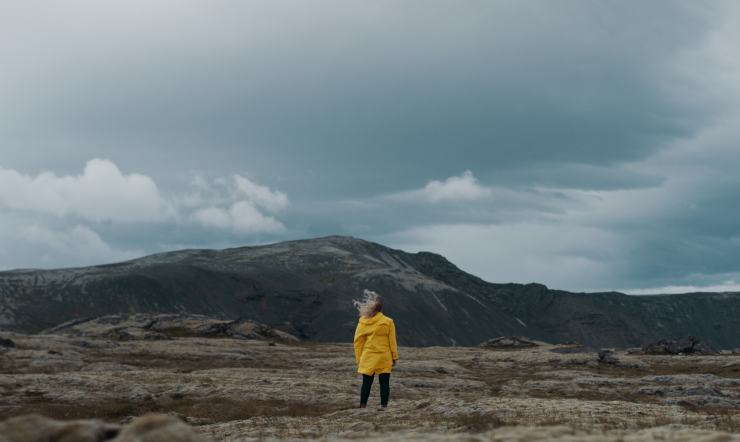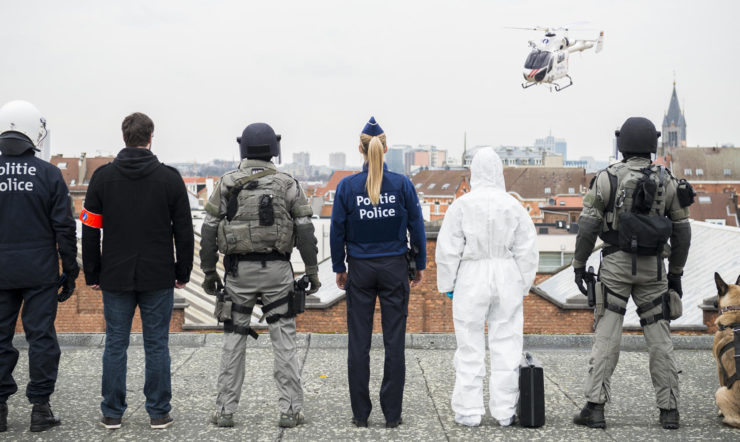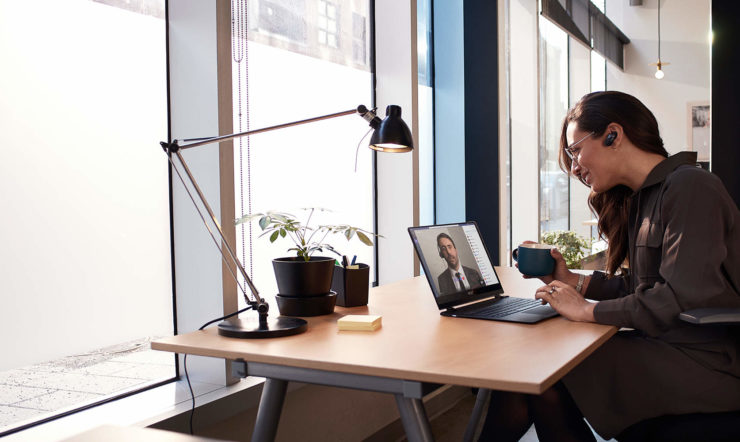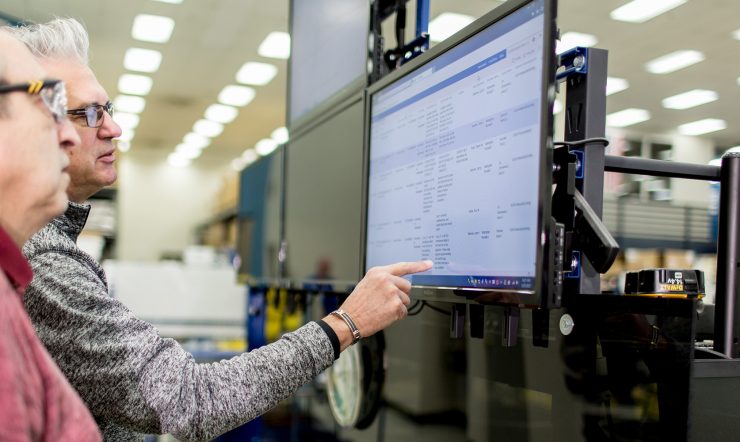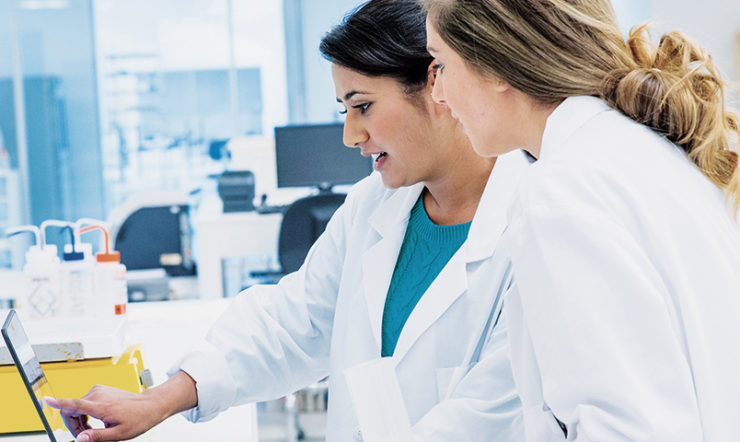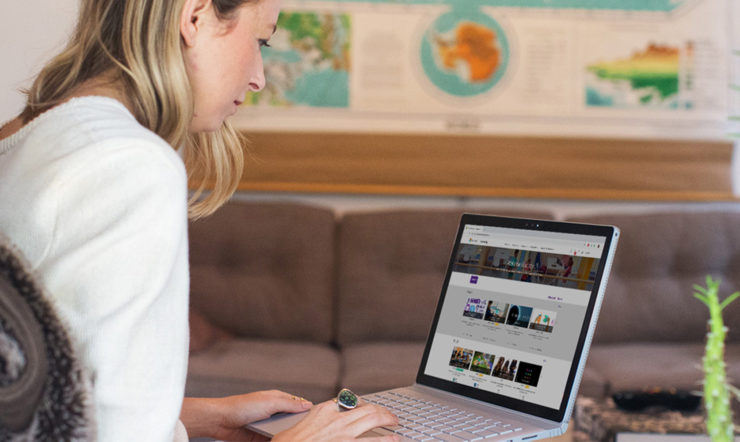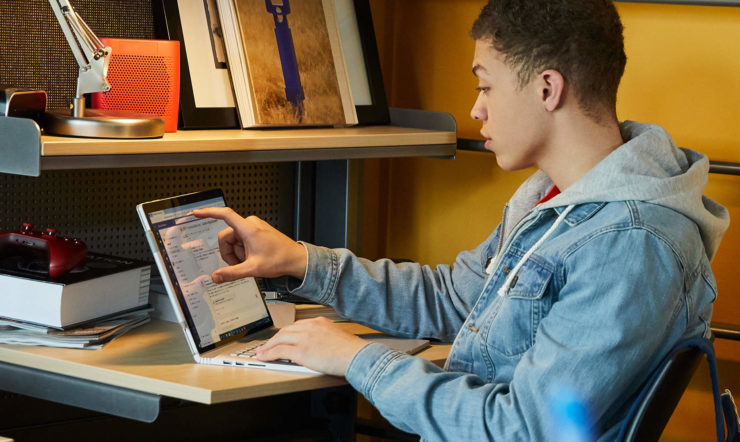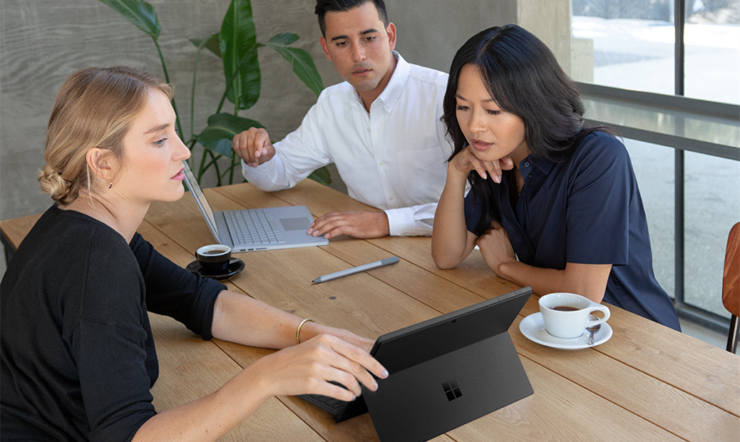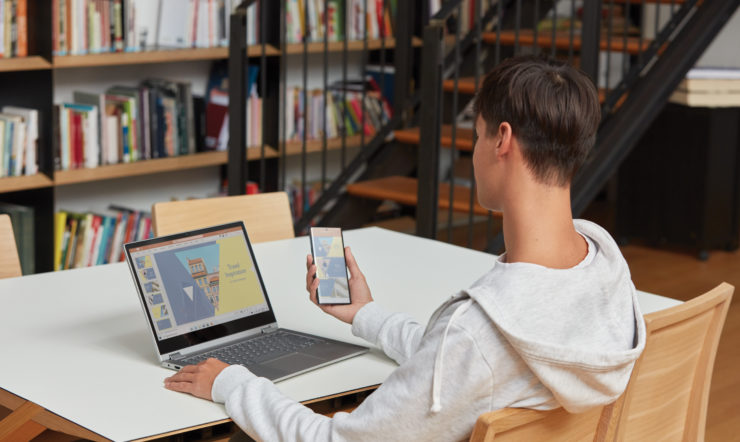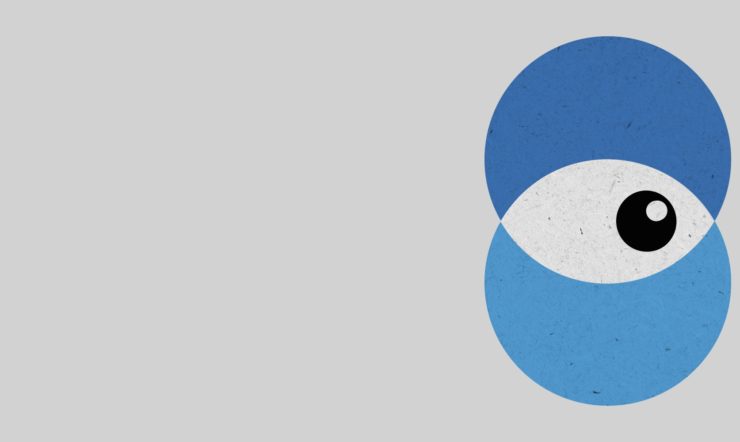Hybrid work is changing the workplace as we know it. And the need for professional and engaging hybrid work solutions fostering meaningful interactions is greater than ever. On December 6, leading experts in the field of modern work gathered at the Microsoft Denmark office to discuss and debate the possibilities and dilemmas of the topic.
More than 100 leaders within HR, facility management, IT & Procurement, and many more gathered at our headquarter in Lyngby to find inspiration on how to create the best possible working environment – physically, digitally, and culturally. The event was co-hosted by Kit Ingwersen, Modern Work Go-to-Market Lead at Microsoft Denmark and Nicolai Ellemann Engelsby Iversen, Chief Philosophy Officer at Voluntas.
Work life balance
“You can only balance things that are fundamentally different from each other – but the term Work-Life Balance tries to teach us that work is something different from life, which is obviously utterly absurd.” The blunt words come from Morten Albæk, author, CEO and founder of Voluntas, who gave an inspirational keynote touching upon both his new book “False Truths in Life” and on philosophical aspects of happiness, satisfaction, and meaningfulness.
“Work is an integrated and embedded part of life, and therefore part of our existence. And that is why we need to strive to find meaning in our work. Not just satisfaction which is shallow, or happiness, which is fleeting – but meaning, which is the only sensible thing to strive for as human beings, because it can co-exist with all our darkest thoughts and hardest times, with both dissatisfaction and unhappiness, and therefore also get us through those times.”
– Morten Albæk, CEO and Founder, Voluntas
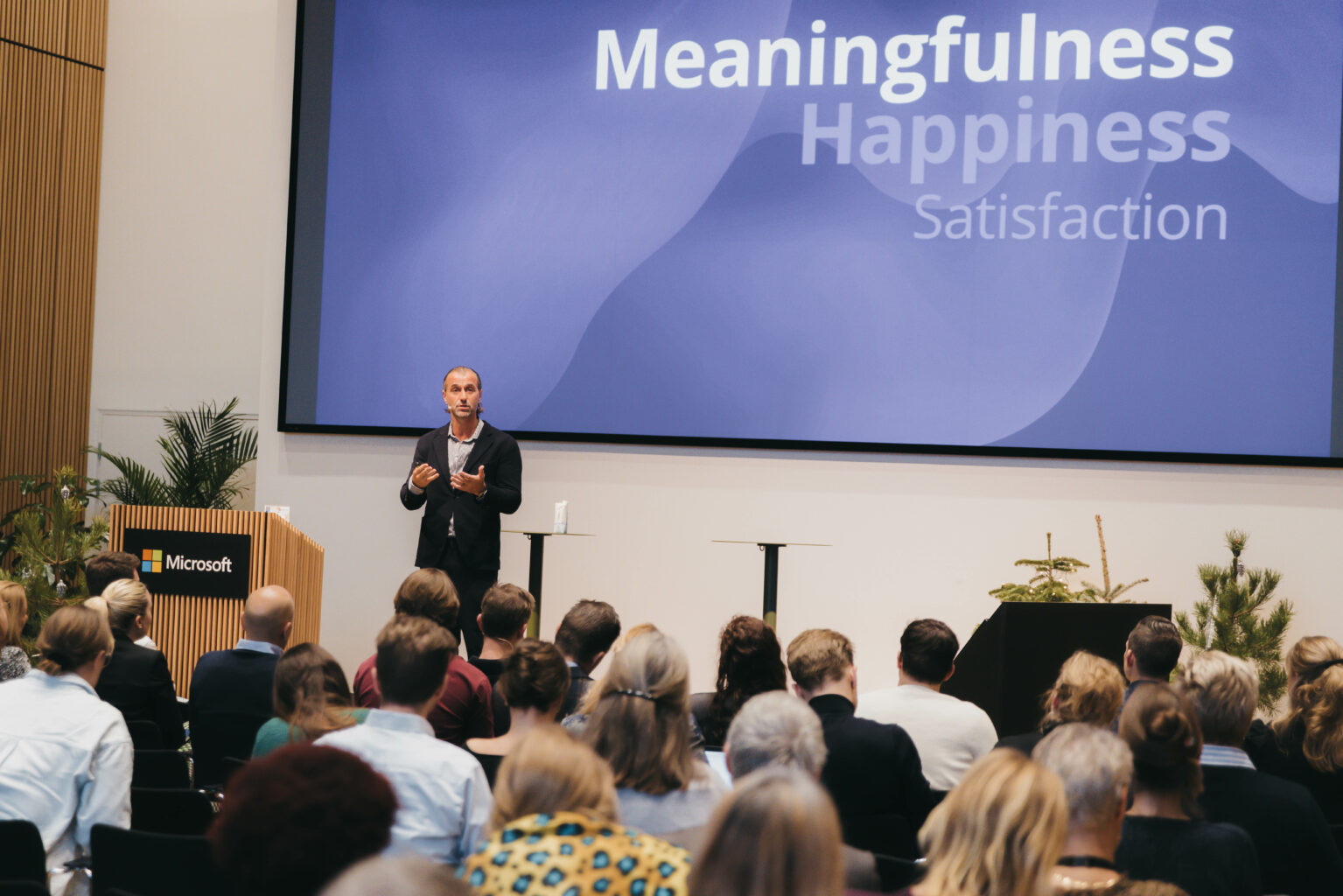
So, a good working environment is dependent on employees feeling a sense of meaning coming to work, Morten Albæk underlined and concluded: “Organizations can increase employees’ feeling of meaning in their work by strengthening their feeling of belonging – by making employees feel safe and secure in being who they are, also while they are working, by ensuring a sense of ownership and responsibility, and by celebrating achievements together.”
Before Morten Albæk’s keynote, Camilla Hillerup, HR Director at Microsoft Denmark, introduced some quite staggering numbers from the recent Microsoft Work Trend Index, which also highlighted the importance of creating meaning and a strong culture – especially in times, where life and work are increasingly intertwined, and our ways of working are changing fundamentally.
“Among many things, the Work Trend Index shows that organizations need to build social capital and re-recruit their employees to increase their sense of meaning. The data shows, that if people can’t learn and grow, they’ll leave,” Camilla reported, underlining that we need to create more trust, and more possibilities for our employees if we don’t want them to find another job. The trust gap covers the fact that 87% of all employees report that they are productive at work, while only 12% of all leaders say that they have full confidence that their team is productive. “This productivity paranoia really shows us that trust needs to be rebuilt”, Camilla Hillerup concluded.
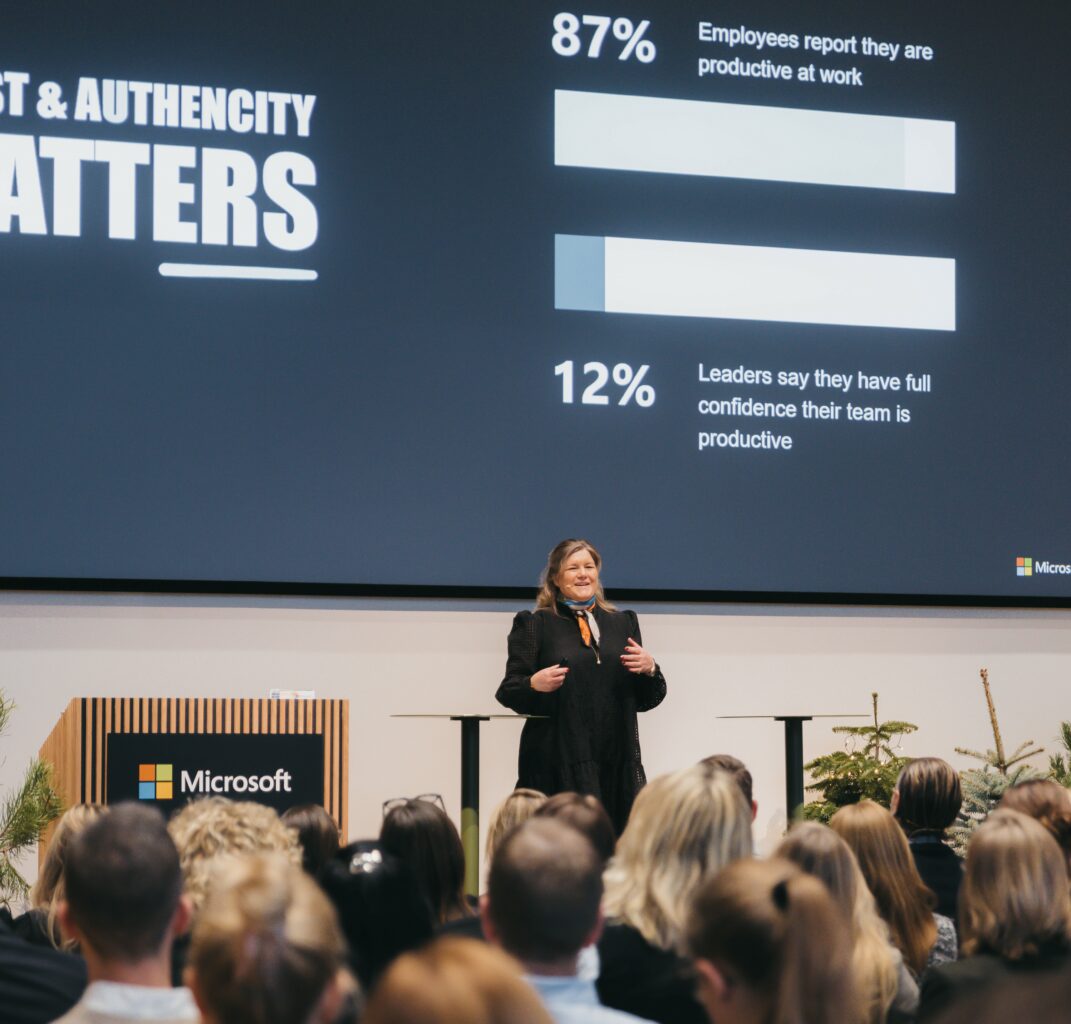
Data leads the way
The needs of the employees and frequent dilemmas in the hybrid workplace were topics for the panel discussion. Camilla Hillerup, Frederik Zebitz, Senior Collaboration & change Consultant at Velux and Marianne Bie Frydendahl, Vice President, People & Organization at Novozymes took the stage.
It quickly became clear that data is crucial in understanding organizational patterns and employee preferences better – especially when organizations are working very differently than pre-pandemic.
Velux used the first wave of the pandemic as a learning situation, performing tests on various ways of working, while also implementing technological tools such as Microsoft Viva, in order to gain insights on performance, satisfaction and workloads – so-called behavioral data.
“We gained a lot of insights on what works best for us in terms of days in the office vs. remote. And we’re still testing to see how we can support our organization in the best way possible. For instance, we can see that our networks become smaller when we only work digitally, and the shorter, more impulsive meetings disappear. Very interesting insights about how massive changes like Covid impact the daily life of people in Velux,” Frederik Zebitz said.
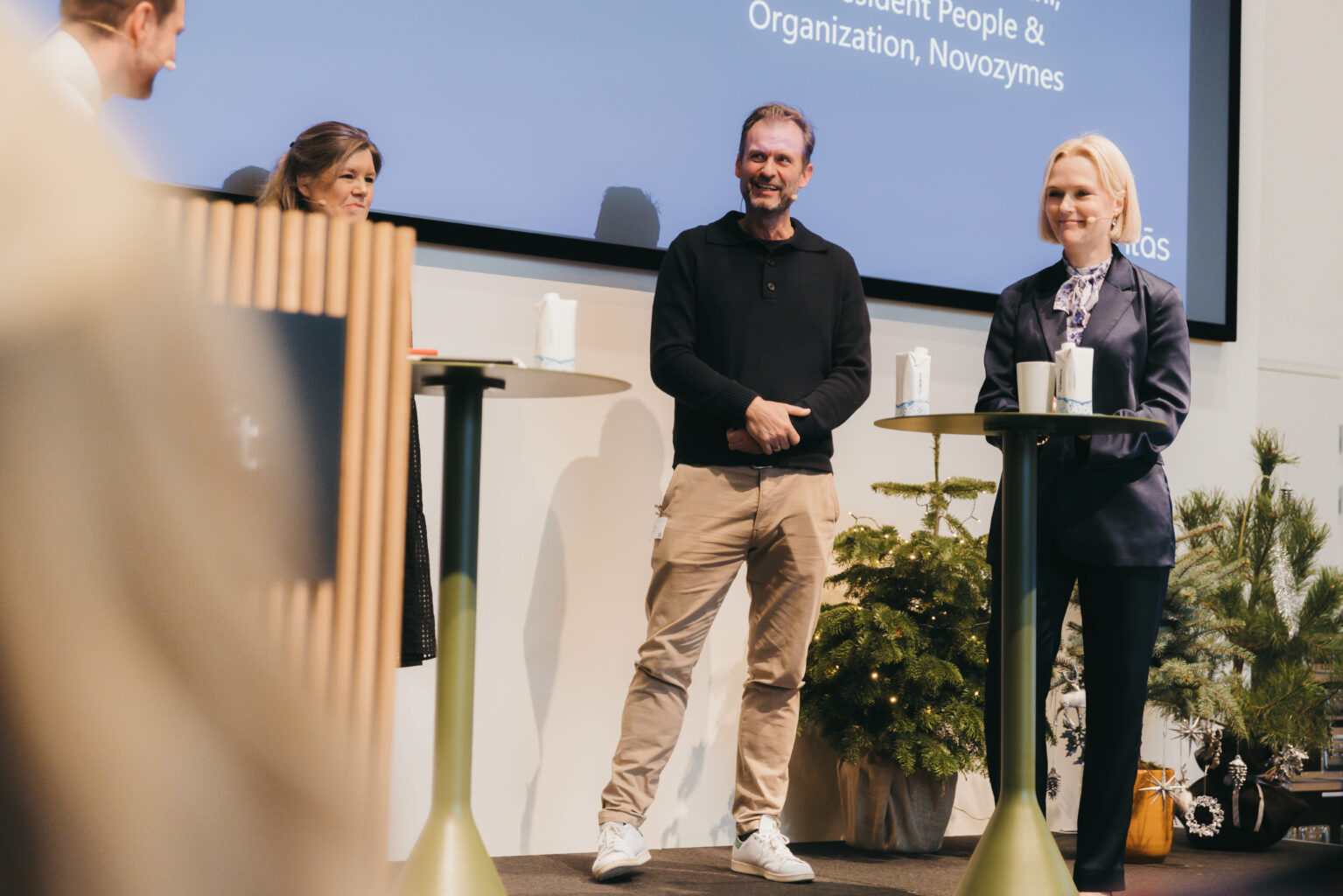
Hybrid Work concretized
In Novozymes, Marianne Bie Frydendahl explained, they have introduced a global framework called ‘Office First Hybrid’, meaning that at Novozymes you are more in the office than you are at home – of course with room for exceptions and individual needs. Marianne Frydendahl elaborated in her keynote on Novozymes’ perspective on meaningful work. She showed the Novozymes leadership framework, which secures development for leaders both in terms of a business and a people perspective: “In this complex world where employees ask for more flexibility, more diversity, more empowerment we also need more structure, so leaders can navigate and are enabled to provide the direction, that the organization is asking for.”
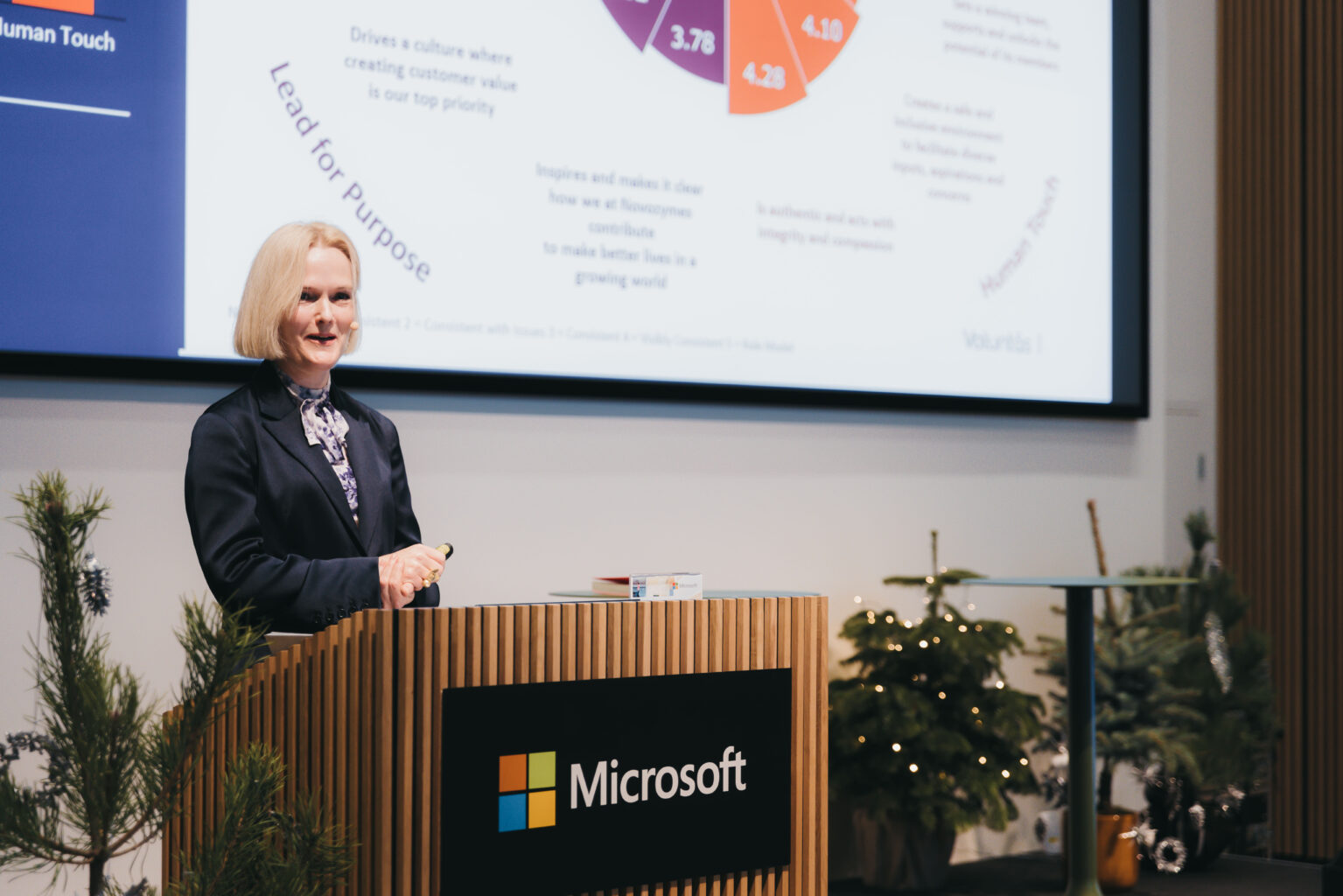
In Microsoft, Camilla Hillerup explained, a barometer is introduced. This guides employees to what kind of touch points they are recommended to attend digitally and which meetings that require in-person presence. On the top of the barometer is ‘all-hands’ meetings, where people can meet their colleagues and feel the buzz of the office. And at the bottom, is online training, which might be more productive doing from home. Camilla concluded: “We experience that a barometer guides our employees to making the decisions of when to come into the office and when to work remotely.”
At the LEGO Group, they have also found it beneficial to put words to and structures behind new ways of working, as Anne Sofie Fedders, Head of LEGO® Ways of Working at the LEGO Group said in her discussion with Kit Ingwersen. “At the LEGO group, we work with the term ‘diversity of thought’, which coins the need for having different skill sets and competencies in every team across the organization Our work is not something we can do in isolation, and therefore we need to make our teams as best as they can possibly be,” she said and added:
We have changed our narrative to focus more on the needs of the team, and less on the needs of the individual. We are not an individualistic culture in the LEGO Group. We are a collaborative culture. Now we emphasize more strongly that you don’t just come to the office for your own needs, but also for the needs of the team and the organization. That is helping us to make the office experience more meaningful for all.
– Anne Sofie Fedders, Head of LEGO Ways of Working, the LEGO Group
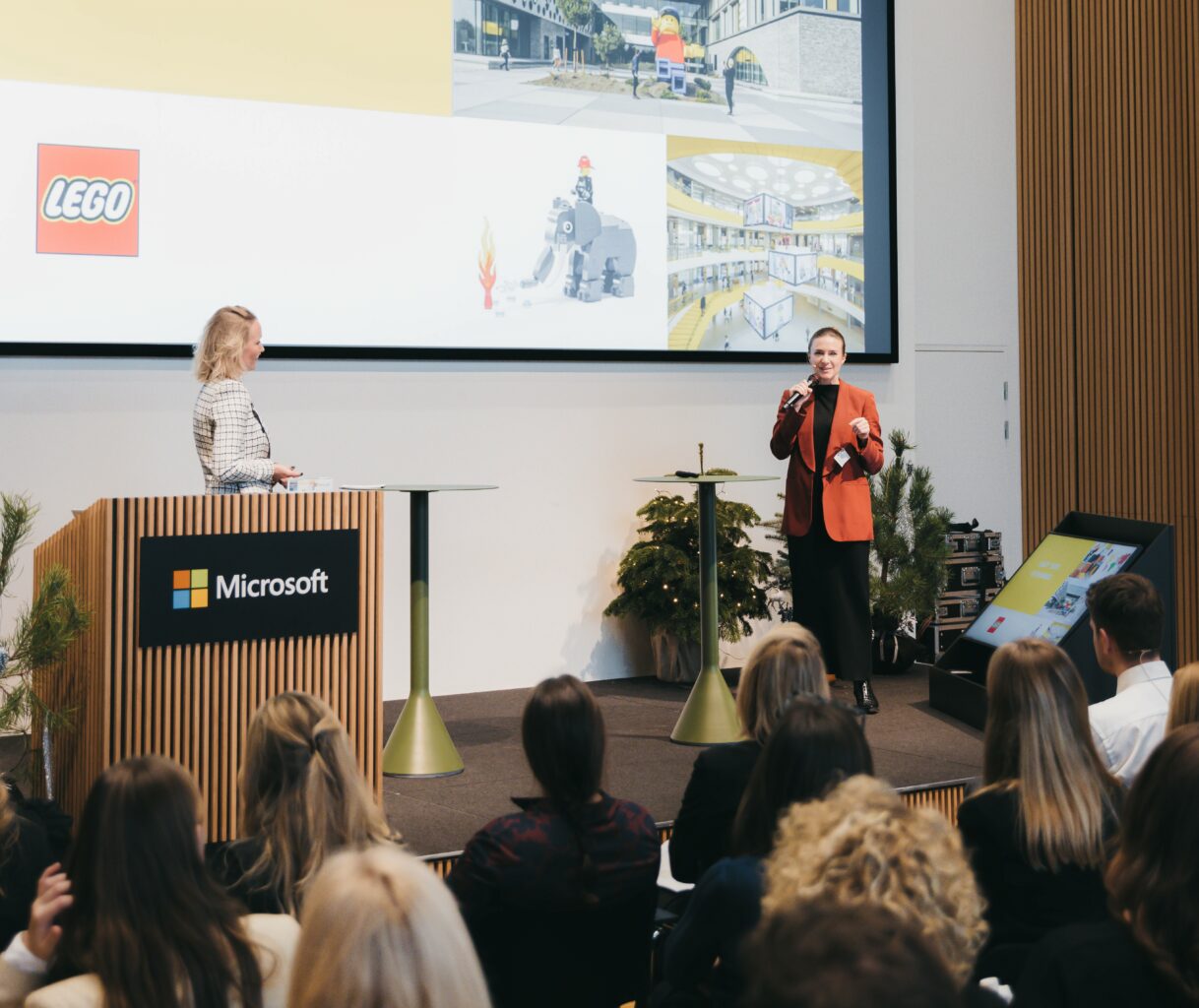
“So, what are the next steps?” Kit Ingwersen asked as she rounded off the main event and gave her concluding marks: “One thing is for sure – our workplaces will continue to change, and we will have to adapt to new ways of working. So, we need to be prepared, we need to be flexible, but we also need to make sure that we focus on creating a strong culture to be able to face the future of work.”
After the main event, the participants were invited to participate in two inspiring workshops. One on Microsoft Hybrid Meeting rooms facilitated by Carsten Bagger Coordt, Teams Technology Specialist at Microsoft. Carsten showcased the many different collaboration tools within Teams and illustrated how technology can help facilitate belonging and shorten the distance between people. Another workshop on “Active Listening” was facilitated by Kristoffer Geer, Engagement Leader at Voluntas, revolving around how to achieve basic techniques in leading a meaningful conversation, and how to overcome virtual space through simple tools to connect across digital distance.
